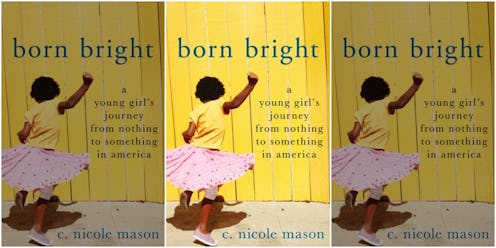
The United States government once declared war on poverty, but we have never been able to stamp it out. The problem continues, constraining the lives of some 47 million Americans and impeding any semblance of social justice. Being able to talk about the issue in the abstract is a luxury many do not have. In the new nonfiction book Born Bright: A Young Girl’s Journey from Nothing to Something in America, author C. Nicole Mason uses her own story to examine the nearly impossible task of rising out of poverty. Her powerful memoir puts a face to the statistics and underscores essential issues we should all consider when talking about poverty and social justice. Mason presents the barriers the poor face and explains why so few are able to achieve economic success.
Born to a 15-year-old mother, Mason had the odds stacked against her from the start. Still, she managed to get into college and ultimately earn her Ph.D., and she is now the executive director of the Center for Research and Policy in the Public Interest. Using both research and anecdotal evidence, she lays out her compelling and improbable journey.
Below are seven important hard truths about poverty and social justice, based on C. Nicole Mason’s Born Bright.
Born Bright: A Young Girl's Journey from Nothing to Something in America by C. Nicole Mason, $18, Amazon
1. There Are Preconditions For Success
In the United States today, being “born bright,” working hard, and wanting a better life isn’t enough; there are inequalities in the system that make it much easier to succeed if you’re born into a financially stable family. Mason points to multiple preconditions that maximize opportunity in society: “quality schools and institutions in neighborhoods, sufficient food, safety, access to adequate health care, stable housing, and the resources and critical information needed to negotiate complex social and political institutions.”
One example she uses is education. If no one in your family or neighborhood went to college, you may not even see it as an option. Mason was lucky enough to find a mentor who encouraged her to imagine the possibility.
2. Poverty, In And Of Itself, Is A Barrier To Social Mobility
When you live in poverty, the preconditions mentioned above aren’t met and your focus is on meeting your basic needs. However, even doing this can be unmanageable. Mason shares the heartbreaking story of a homeless woman who needed a job to support herself and her two children. During a job interview, she left her kids in the car — a cheaper but clearly risky form of child care — only to be arrested by a police officer who saw her children left alone. She ultimately was charged with two felonies and lost custody of her kids.
3. The Poor Aren’t Just Lazy
The public perception of the poor is often negative; many see the poor as lazy or seeking to game the system. While that may be true in some cases (just as such people exist in all tax brackets), the blame is unfair. Being born into poverty automatically limits the chances of your economic success for the reasons above and more. As Mason points out, only four percent of those born into the bottom fifth of Americans economically will ever make it into the top fifth.
4. The Systems In Place Don’t Always Work
The United States does have systems that are intended to offer support to the poor, but let’s face it: Those systems aren’t all that successful. (We wouldn’t have 47 million people in poverty if they were.) Mason uses the example of Temporary Assistance to Needy Families (TANF). While 70 percent of those funds once provided basic assistance to families in need, that number had decreased to just 29 percent in 2011.
“In a real sense, we are already doing without a robust social welfare system in America,” writes Mason. “Since the end of the War on Poverty, the social safety net has continued to erode, a trend accelerated by the Reagan administration.”
5. The Gap Between The Rich And The Poor Has Grown
The U.S. economy has seen growth, in terms of GDP, over the last 40 years, but unfortunately, the effects haven’t trickled down to the poor. Mason cites data that shows that the top one percent of families accounted for 52 percent of total income gains between 1993 and 2008, while families in the lowest percentile have instead seen substantial declines in income. It looks like the saying “the rich get richer, and the poor get poorer” holds true.
6. Race And Sex Matter — A Lot
Conversations about poverty must include mention of race and sex. Mason highlights the fact that poverty is most prevalent among blacks and Latinos as well as women-headed households. This fact underscores injustices in our society:
“Those who are the most vulnerable, who are most likely to be marginalized in the labor market or in the economy, or who have been on the receiving end of historical racial and gender discrimination in most, if not all, of the systems and institutions in our society—these people are most likely to be poor,” writes Mason.
7. Fighting Poverty Doesn’t Have To Be A Losing Battle
To this point, the United States hasn’t done a very good job of fighting poverty, but that’s not to say that it couldn’t. Mason offers solutions that could work, like job training and social support programs. Additionally, she believes that we need to change the perception of poverty and humanize the poor. Books like Born Bright are a part of doing just that.
Born Bright: A Young Girl's Journey from Nothing to Something in America by C. Nicole Mason, $18, Amazon
Images: Giphy (7)